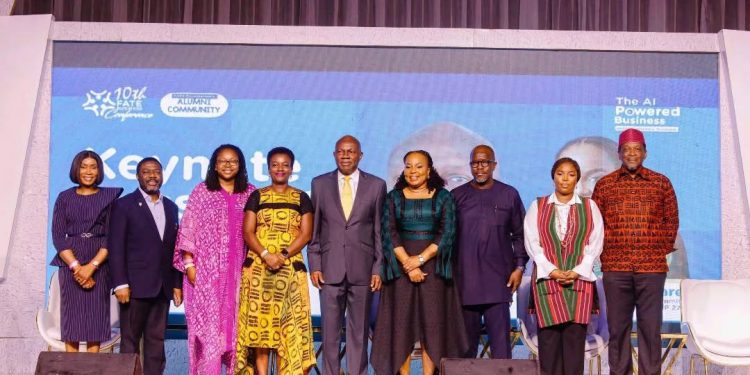FATE Foundation marked a decade of entrepreneurial dialogue with its 10th Business Conference (FBC) at the Balmoral Convention Center in Lagos, bringing together entrepreneurs, policymakers, and business leaders to explore how artificial intelligence (AI) can transform micro, small, and medium enterprises (MSMEs).
Held under the theme “AI-Powered Business: Innovate, Automate, Accelerate,” the conference featured keynote addresses, panel discussions, exhibitions, and a pitch competition aimed at equipping Nigerian entrepreneurs with tools and insights to succeed in an increasingly digital economy.
Adenike Adeyemi, Executive Director of FATE Foundation, opened the event with a welcome address, reflecting on the journey of the conference. She said it started as an idea to bring entrepreneurs together to network and learn, and over the years, it has evolved into something exciting, a hub of innovation, collaboration, and transformation for Nigerian businesses.
The first keynote session, titled “The Future is Now: Embracing AI for Sustainable Competitive Advantage,” was delivered by Sunny Iroche, Executive Chairman of GenAI Learning Concepts. He explained the layers of artificial intelligence, from AI as a technique for computers to learn, make decisions, and solve problems, to machine learning for detecting patterns in data, deep learning for processing complex information, and generative AI for creating content such as text, images, or code. He emphasized that the future is not about humans versus AI, but humans with AI versus humans without it, and urged entrepreneurs to apply AI in sectors like agriculture, creativity, education, and healthcare. Iroche outlined strategies to innovate business models, automate processes, and accelerate growth, showing how AI can be applied practically rather than remaining a distant, theoretical concept.
The second keynote session, “AI as a Catalyst for Innovation: Unlocking New Frontiers in Business Strategy,” was delivered by Adedeji Olowe, Founder of LendSqr and Chairman of Paystack. He focused on practical steps MSMEs can take to integrate AI into their operations, urging entrepreneurs to build a strong online presence, automate internal processes, and start with free or affordable AI tools. He reassured business owners not to fear data theft, highlighting that simple applications could already improve efficiency, visibility, and growth. Olowe also encouraged MSMEs to leverage online resources like YouTube tutorials to learn website development, social media management, and AI-driven solutions without incurring high costs.
The first panel session, “The AI Starter Kit for Every Entrepreneur,” featured Olatunbosun Alake, Commissioner for Innovation, Science and Technology in Lagos State, Matthew Wallace, Co-founder of ONOW Ascent Inc., Bode Abifarin, CEO of Strata, and Professor Peter Adewale Obadare, Founder of Digital Encode Ltd. Panelists emphasized that understanding one’s business and maintaining clean data are critical before adopting AI. Bode Abifarin advised entrepreneurs to first identify processes that are truly automatable, while Professor Obadare cautioned against overestimating AI, noting that human oversight remains essential. Olatunbosun Alake highlighted transparency, accountability, and proper algorithm deployment, stressing that responsible adoption is just as important as innovation. Matthew Wallace encouraged entrepreneurs to personalize AI to their specific business context, suggesting that tools like ChatGPT could assist with finance management, record-keeping, and system organization. Practical tools for HR, branding, and finance discussed included Canva Magic Write, Canva Brand Kits, Mailchimp AI, Zoho Inventory, and Zoho Invoicing.
The second panel, “Leveraging AI for Business Growth and Profitability,” explored how AI can boost sales, streamline operations, and improve decision-making for MSMEs. Tolulope Akinyele, Senior Industry Manager at Google, emphasized the importance of collecting and interpreting customer data through social media, Google Forms, and Google Sheets, and encouraged entrepreneurs to invest in online advertising to increase visibility. Yomi Akinyemi, Partner at KPMG Nigeria, focused on human resources and finance, explaining that MSMEs must begin with clarity, establishing objectives to integrate AI effectively into their business processes.
Participants shared their impressions and key takeaways. The CEO of Glims Farm and Food Limited said his main insight was how to apply AI in marketing and HR and expressed gratitude for the exposure gained. The founder of Exotic Bella Enterprise valued learning how to analyze business data using AI and praised FATE Foundation’s alumni support. The CEO of Green Feat Agro said she would immediately leverage AI for marketing and data analysis, describing the conference as inspiring and informative.
The conference also included a pitch competition, where five finalists competed for up to N1 million in funding, alongside mentorship opportunities and investor exposure. Over seventy alumni-owned businesses exhibited products and services, providing participants with networking opportunities and access to potential markets.
The 2025 edition celebrated ten years of the FATE Business Conference, which began in 2016 as the FATE Alumni Conference and has since hosted over 5,000 entrepreneurs, featured 200 speakers, and exhibited more than 150 alumni-owned enterprises. Adenike Adeyemi described the anniversary as both a milestone and a call to action, emphasizing the conference’s mission to prepare entrepreneurs to innovate, adapt, and accelerate in an AI-powered future.
For MSMEs, the 10th FATE Business Conference reinforced that adopting AI and digital tools is no longer optional but essential for survival and growth in today’s economy. By providing actionable strategies, practical tools, and mentorship, the conference demonstrated how technology can be harnessed to create sustainable competitive advantages for small and medium enterprises in Nigeria and beyond.










